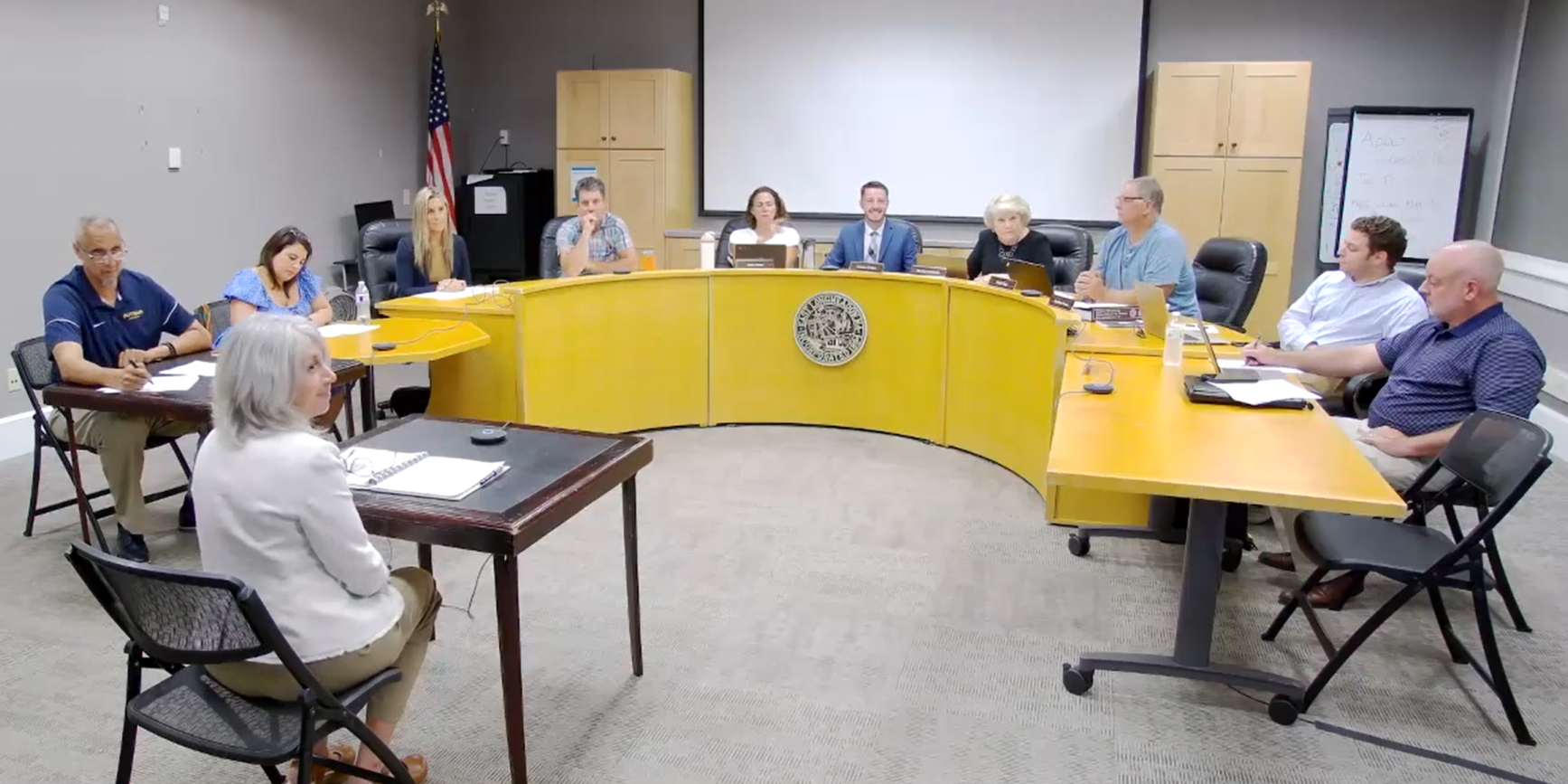The East Longmeadow Town Council and School Committee interview Kerri Jarzabski for a vacancy on the committee.
Photo credit: ELCAT
EAST LONGMEADOW — After a joint meeting in which the East Longmeadow Town Council and School Committee interviewed five applicants, Kerri Jarzabski was chosen to fill a vacancy on the committee left by the exit of Sarah Truoiolio.
School Committee members Aimee Dalenta and William Strother and councilors Kathy Hill and Marilyn Richards took turns asking the applicants questions ranging from the role of the School Committee to personal bias and informed decision making.
Cathy Hood, who taught in East Longmeadow Schools before retiring, said public schools must be holistic and address all the needs of their students. It is the School Committee’s job to make sure that happens, she said. Katie Freeman emphasized the School Committee’s role in providing equitable learning opportunities for all students.
Natalee Georgantas and Jarzabski both enumerated some of the tasks that fall to school committees, such as overseeing a budget and ensuring a district remains aligned to its stated goals. More than that, Georgantas said the School Committee must “make sure each student gets everything they need to succeed, to thrive.” Jarzabski said an understanding of how to work with the state Department of Elementary and Secondary Education was important.
The candidates were asked how they would deal with the situation in which their personal values conflicted with the values of the larger school community. Each of the applicants said it was important to remove personal biases when making decisions that affect students, staff and families. Instead, they said, listening should be the priority.
Strothers spoke to the responsibility of the School Committee to make decisions on wide-ranging topics and asked how each candidate would tackle issues in which they were not an expert.
Again, each of the applicants gave similar answers, saying they would speak to as many people as possible and consult the stakeholders to identify people’s needs. Hood said that no matter the topic, the School Committee must “give each child what they need and meet them where they are at.” Freeman said being in conversation with the community would provide a lens on all sides of an issue.
As a physician’s assistant working in an emergency department, Georgantas said she was used to making tough decisions. Despite having a different perspective from the other candidates, who each had backgrounds in education, she also responded that she would look at the whole picture and listen to all parties involved.
Underpinning Jarzabski’s background in higher education, she said she would research as much as possible, while Michelle Jones suggested “humbling ourselves to ask for help” from other school committees who have experienced similar issues.
In June 2026, Superintendent Gordon Smith will retire, and the School Committee will lead a search for his replacement. Hill asked what qualities each of the applicants would look for in a new superintendent.
For Hood, she said, “experience is big for me.” She said she would look for someone who has been in leadership roles within education. It was also vital to her that the new superintendent would be able to follow through transitioning from the old high school to the new building. Finally, she said she would look for someone who could create a relationship with the School Committee, Town Council and state legislators.
Freeman said people in roles of leadership should have first-hand experience in the roles they oversee, and therefore she would like a superintendent who had been a classroom teacher. She also highlighted the superintendent’s responsibility in union negotiations.
In addition to knowing a candidate’s education and experience, Georgantas said she would want to know what the person’s positions are on issues such as a bell-to-bell cellphone prohibition. Michelle emphasized the need for a superintendent to be a “life-long learner” who can expand their understanding of education and be “willing to take risks.”
Jarzabski was the only applicant to mention the importance of licensure for superintendents. Aside from that, she said that, as the face of the School Department, a superintendent needed to be a strong communicator and be present in schools. In the modern educational system, they must also be capable of crisis management, she said.
When discussing the applicants, the council and committee members considered their skills and backgrounds and if they would bring perspectives that the committee is lacking. They each listed their top two candidates. Hood received several nods, with people appreciating her first-hand experience in the town’s schools and the fact that, as a retired person, she can dedicate time to the role on the committee. A vote on whether to appoint Hood failed 4-6.
Ultimately, 10 of the 11 interviewers said Jarzabski was among their top contenders. They spoke about her experience in higher education lending a fresh perspective, and her consideration of licensure and the impact of DESE. While all agreed that any of the applicants would perform well, Jarzabski was selected with a near unanimous vote. She will serve on the committee until the next annual election in June 2026.


